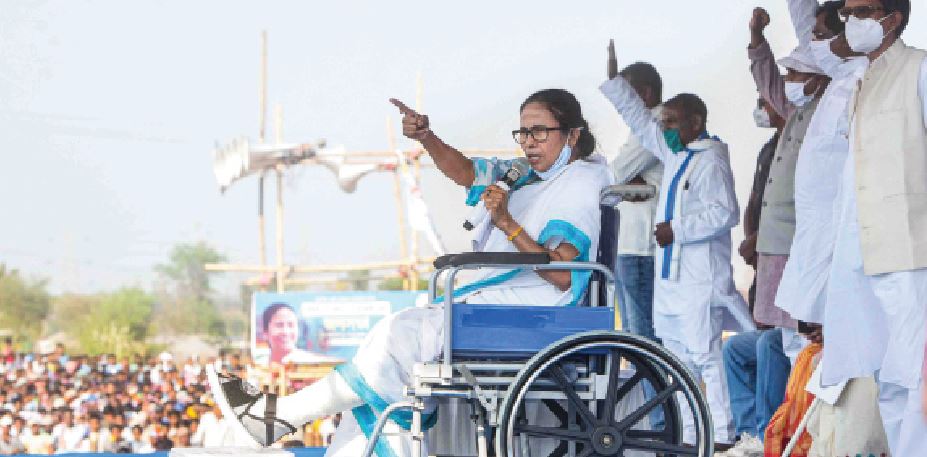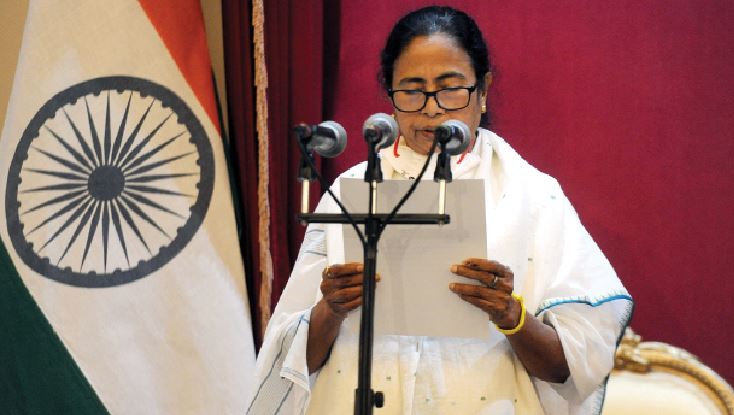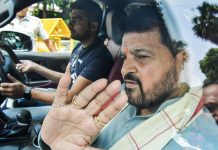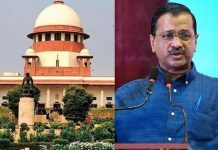 The recent election was a war fought between the un-equals: the giants and the dwarfs. In Bengal, the diminutive Mamata Banerjee was the sole woman, slender and tiny, fighting the giants in the BJP
The recent election was a war fought between the un-equals: the giants and the dwarfs. In Bengal, the diminutive Mamata Banerjee was the sole woman, slender and tiny, fighting the giants in the BJP
When Mamata Banerjee declared being just a “streetfighter”, she was clearly underplaying her might. If anything, Mamata’s strength lies in her capacity to fight and fight well.
She did exactly that in the recently concluded election of West Bengal. She not only fought but fought well, demonstrating her ability to vanquish and overpower her alleged oppressors, in this case the BJP. Angels fight demons; the Goddess slays them but Banerjee fought the goons.
That Mamata Banerjee is a street fighter is a given. But the recent election was not a street fight; neither was it a battle. If anything, it was a war and, that too, one which was fought between the un-equals: the giants and the dwarfs, or to borrow from Jonathan Swift: the Lilliputians. In the West Bengal election, the diminutive Mamata Banerjee was the sole woman, slender and tiny, fighting the giants in the BJP.
The giants had descended on her state with full might: they pulled all sops, used both money and muscle to make her bend. But she did not succumb. She campaigned and campaigned well, strapped to a wheelchair.
The wheelchair became controversial and then symbolic: quite like Delhi Chief Minister Arvind Kejriwal’s erstwhile muffler: his trademark when he had coughing bouts. It was only after he underwent a surgery that he shed off his muffler. Mamata Banerjee too gave up the wheel chair after she won the election.
The wheelchair had gained prominence after Mamata Banerjee’s alleged accident: alleged because there were, then, several theories doing the rounds. One that she was pushed by the BJP goons and the other that she is faking it to gain sympathy and paint the BJP black.
Politics is in Mamata Banerjee’s blood. And painting the BJP black is like Chandi path that she was heard reciting publicly when the competition with the Gods got a bit much. The BJP had tried to invade West Bengal with their brand of Gods more prominently Lord Ram. TMC’s counter came through Goddess Durga who is all pervasive in the mind of every Bengali.
However, BJP stoked the fires when the state chief questioned the lineage of the goddess even as it eulogized Ram on grounds that even while the world knows the names of Ram’s ancestors, the same cannot be said about the Goddess.
As for faking the accident, faking and Mamata do not go together. Yes, she can and did politicize the issue but that is different from actually faking the accident. Therefore, the bottom line is that Mamata Banerjee was injured and she cashed in on it during the elections. That she was hospitalized and later confined to a wheelchair is also true. She did flag the incident for political benefit like normal politicians would and therefore cannot be held accountable for that. For, like in love and war, everything is fair in politics, particularly when the opponent is lethal, destructive and obnoxious.
The BJP while taking on Mamata was all of that. It stooped to a new low with none other than Prime Minister Narendra Modi taking the lead. His catcall of Didi…o didi, is to quote Mamata Banerjee “like a young man making a pass at a woman”.

For the uninitiated Modi had at an election rally given a didi…o didi catcall which did not go down well. This was for more reasons than one: it had lowered the dignity of the office that Modi holds; it was abusive; its tone and tenor was offensive. Worse still it was gender-insensitive.
For the BJP, Prime Minister Modi’s jibe proved to be counter-productive. While it conflicted with the sensitive Bengali psyche, it gave Mamata the political ammunition that she much-needed to target Modi. Hence the simile of a young man making a pass.
Sympathy was already building up for Mamata Banerjee as the election progressed; the wheelchair bound diminutive and somewhat defenseless Mamata Banerjee was no match to the BJP’s big and rich boys. They were spitting fire and spewing venom at her, heaping abuse and often getting personal.
This perhaps was the defining moment and led the electorate to back her to the hilt. Outsiders, the people of Bengal decided, could not bully a woman,especially one of their own. Therefore, the Bangla’s nijjer mein, daughter of Bengal, sentiment overrides all others.
Governance failures, and there were some including the issue of corruption amongst the rank and file, took a back seat and it seems that the majority of the people were on a mission: to save one of their own from outsiders.
There were apprehensions that the misdeeds of her men, be it corruption, violence or high handedness, would electorally haunt her. Perhaps they did to an extent. But what really came out on the ground was that this was not the time to punish Didi. It was a time to rally around her when the enemy had struck. This was the clear message of the Bengal election to the BJP, the people outside West Bengal and to India as a whole: If the enemy comes knocking we will not only slam the door but push him out with all our might.
The way it panned out was that a single woman was fighting the demons. This was true in more ways than one: Mamata Banerjee was taking on everyone singlehandedly, her mission to win and vanquish in what clearly was a do or die battle. She fought like Durga to protect her motherland when it was under threat. And in this the people of Bengal pitched in with her.
Mamata’s commitment to the people, particularly the poor and the disadvantaged has stood her in good stead. Whatever her critics may allege, she is kind of blinded in her passion to improve their lot and lives: a trait rare in politicians.
Mamata belongs to that breed of politicians who are fiercely committed to whatever they have set out to do, less for themselves and more for others. They are born crusaders and would go to lengths to make dreams real. Mamata is one such. Not the one to mince words or play to the gallery, Mamata identifies with an average Indian. She is brutally honest sometimes to the point of being brash. Mamata’s nucleus may be power but central to it are her people and their progress. This distinguishes her from the run of the mill who seek for themselves. Mamata lives and breathes for her brand of people.
Add to this Mamata’s personal credibility and the picture is complete. Even though corruption was a major issue in the recently concluded state election, Mamata’s integrity was never in question: “Why should there be so much greed” she had said after RJD chief Lalu Prasad Yadav was convicted in the fodder scam: “unless one indulges in a life of luxury there is no need to resort to corruption”.
That Mamata leads a frugal lifestyle is well known, going about in hawai chappals and a thin bordered cotton saree, both totaling under 1000 rupees.
As Railway Minister, she was upset with her predecessor Yadav for using a free lifetime pass which entitled him and three companions to travel first class. Unlike Yadav, Mamata Banerjee did not travel in the executive saloon. She also refused to move into a ministerial bungalow allotted to her in Lutyen’s Delhi saying that she is not comfortable living in a bungalow. Even in her modest government flat in New Delhi, she had installed only one air conditioner against her entitlement of three. If reports are anything to go by, on her first day in office as Union Railway Minister, she paid for tea and snacks for visitors from her personal account.
That she is perceived to be clean is a given. Even her critics do not associate corruption with her. The blame is at the doorstep of her party men and women, the refrain being that Didi is good; it is the people around her that are rotten. This is quite similar to the sentiment that had surfaced during Rajiv Gandhi’s tenure as Prime Minister: “good man but surrounded by the wrong people”.
And while on the Gandhis, one is reminded of what Indira Gandhi told India’s Ambassador when he came up with a diplomatic query on how the US President should address Mrs Gandhi: “He can call me Madame Prime Minister, he can call me Prime Minister if he wants. You can tell him my colleagues call me “Sir”, she told a somewhat aghast diplomat.
Banerjee’s colleagues may not call her Sir but after her spectacular victory, Didi, for the people, has had an image change: she has emerged as the new dada of Bengal: a honorific used to Bengal’s very own cricket god Sachin Tendulkar. In Bangla, Dada is the elder brother.
In Mamata’s case, however, the word has a different connotation. She sure is the new dada of the state but it is not a brotherly reference. Also it is less Bengali and more Hindi. In Hindi, the word dada means strongman.
Mamata’s thunder in rallies: “With one foot, I will win Bengal and with both feet I will win Delhi” had a roar of a wounded lioness. Equally, it demonstrated her killer instinct and showed up her game-plan to widen her footprint outside her home state of West Bengal. Therefore, if the pre-election didi has currently emerged as dada, it sure fits in.
tehelkaletters@gmail.com












